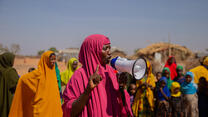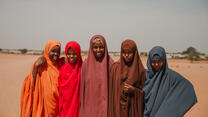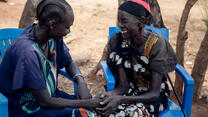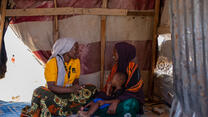Diversity, Equality and Inclusion (DEI) is a key component of the IRC’s strategy and vision, and has been identified as a core global priority for our new strategic plan, Strategy100, that will guide our work as we approach the 100th anniversary of the IRC’s founding in 1933. Over the past year, the IRC has made significant investments in DEI, and taken concrete actions to deliver on our DEI commitments. More remains to be done, but the IRC is committed to reporting on our progress towards our overarching DEI Vision and the pillars articulated below that underpin this vision.
The IRC’s DEI Vision
At the IRC, our diverse clients, partners and staff have the power, voice and agency to shape programs and operations. Within the IRC, we actively work to end all forms of systemic discrimination and foster an inclusive working environment where everyone feels respected, heard, valued and supported. Our programs seek to reduce disparities in outcomes which are driven by systemic inequality.
Principles that guide our DEI work
- Client-centered: We are pursuing DEI with the ultimate aim to better serve our clients in alignment with our organizational mission.
- Intersectionality: We adopt an intersectional, feminist lens to proactively understand and work on transforming power structures and norms.
- Decoloniality: We acknowledge and challenge the legacy of colonialism and racism in our sector.
- Accountability: Our DEI efforts connect every part of our organization to drive commitment at all levels. Each of us takes responsibility for our actions.
- Engagement: Our efforts are supported by two-way communication to share power.
Action to Date (June 2021)
DEI Structures
- Developed staff-led Diversity, Equality and Inclusion priorities to be incorporated in the IRC’s Gender Equality Diversity and Inclusion (GEDI) Action Plan.
- Launched the IRC DEI Unit and currently recruiting Chief Gender, Equality, Diversity and Inclusion Officer.
- Launched the DEI Council of the International Rescue Committee to provide diverse constituencies of IRC colleagues a meaningful opportunity to deliberate the best ways to address the issues they believe require the attention of IRC leadership, in order to make the IRC more diverse, equitable and inclusive.
Progress on DEI Organizational Support
The IRC Leadership Board allocated the highest discretionary investment budget for FY21 to items related to DEI, including hiring an internal, experienced DEI Interim Lead, Cica Dadjo, and a team of nine experienced and highly-skilled IRC staff chosen from across the IRC regions and teams to form an IRC DEI Interim Team. The team gathered information using insights from:
- Over 110 listening sessions across the organization with more than 2,000 participants
- 90 key informant interviews
- Eight Regional Dialogues where feedback was collected from staff, including frontline staff
- Statements/reports from peer organizations
- ERG and DEI Council reconsiderations, GARD network demands, and DLG commitment
Goal 1: “Who We Are”
- Committed to leadership diversity goals related to gender identity, race/ethnicity, and nationality, including that 50% of our global and regional senior leaders identify as races/ethnicities under-represented in global power structures.
- Improved recruitment practices to attract more diverse talent and hired a recruiter to focus on interns, early career and diversity efforts.
- Audited HR policies and practices (including pay practices) and developed a global DEI demographic all-employee survey (to be launched by September)
- Launched self-identification campaign in Workday to include race/ethnicity, citizenship, sexual orientation, gender identity and disability status.
Goal 2: “What We Do"
- Reiterated our commitment to channeling 25% of our funding to local and national responders (by 2024) and made new commitments, such as increasing our resources to local partners by half in 2021 (compared to 2020) and continuing to build partnerships with local actors, half of whom will be women-led/focused.
- Set an ambitious target that each IRC office identify local civil society organizations with whom to prioritize building long-term strategic relationships. This will amount to at least 150 organizations.
- Piloting client engagement models across ~60% of our Resettlement, Asylum and Integration (RAI) offices including but not limited to participatory design, client advisory bodies, focus groups and office panels.
- Embedded GEDI in the IRC’s program quality standards and committed to documenting plans for including GEDI in Country Program work with clients and partners as part of their strategic planning processes.
Goal 3: “What We Say and How We Engage”
- Began closing gaps in access to information by increasing investment in translation resources internally including live-translation resources for critical announcements.
- Created an internal RescueNet page dedicated to “Equality” for global staff updates and links to Employee Resource Groups.
- Strengthened our messaging and imagery guidelines to ensure our narratives and imagery depict people with dignity and agency. To date, 28 trainings have been completed for 364 staff and consultants, with more scheduled in the coming weeks.



